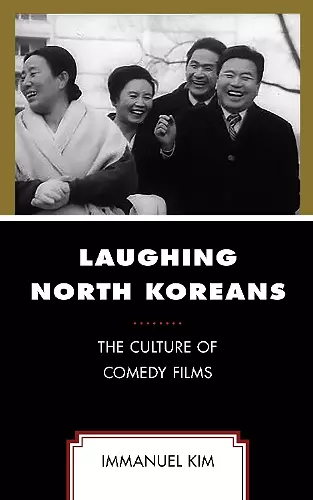Laughing North Koreans
The Culture of Comedy Films
Format:Paperback
Publisher:Lexington Books
Published:15th Sep '21
Currently unavailable, and unfortunately no date known when it will be back
This paperback is available in another edition too:
- Hardback£85.00(9781793608291)

This study analyzes North Korean comedy films from the late 1960s to present day. It examines the most iconic comedy films and comedians to show how North Koreans have enjoyed themselves and have established a culture of humor that challenges, subverts, and, at times, reinforces the dominant political ideology. The author argues that comedy films, popular comedians, and the viewers have an intricate interdependent relationship that shaped the film culture—the pre/post production of filmmaking, film-watching experience, and the legacies of actors—in North Korea.
Laughing North Koreans: The Culture of Comedy Films is ultimately a fascinating and extensive study of a subject seldom covered in this way. Immanuel Kim draws the reader into a cultural space where unexpectedly there are starts like Kim Se-yong and franchises such as the My Family's Problem series, which North Korean audiences really could have engaged with and followed through the years. Readers will be more than satisfied with Kim's careful analysis of these films and the legacies and histories they leave.
* European Journal of Korean Studies *At last there is a book that reads North Korean cinema beyond the usual focus on political events, personality cult, and propaganda function. Focusing on seldom-studied comedy films from North Korea, Laughing North Koreans: The Culture of Comedy Films opens up the field by situating North Korean cinema at the confluence of national cinema, film genre, cultural studies, and identity politics. Immanuel Kim’s exciting, finely-researched book is a must-read for anyone interested in socialist cinema, Korean film history, and North Korean history, film, and culture. -- Dong Hoon Kim, University of Oregon
Kim (Korean literature and culture, George Washington Univ.) analyzes film comedy in the Democratic People’s Republic of Korea, looking at the impact comedians have had there. Kim provides a fascinating discussion of how filmmakers and actors negotiate required ideological and political rhetoric, reinforcing Juche (the state ideology) and the dictates of the ruling Kim family, while at the same time provoking laughter. In the book's five chapters Kim examines "comedian comedy," Boasting Too Much (a 1970 spy satire), the My Family’s Problem films (1973 onward), A Day at the Amusement Park (1978), and the visual and traditional culture found in North Korean romantic comedies. The volume doubles as a study of Kim Se-yŏngin (winner of the People’s Actor award), who stars in most of these films and is, Kim argues, "the most important actor in North Korean comedy films" (p. 12). The volume is well written and eminently readable. . . this is a valuable book on an underrepresented topic and on what Kim refers to as “the process in which films are conceived, negotiated and produced in the North Korean film industry" (p. 58). Summing Up: Highly recommended. Upper-division undergraduates through faculty.
* ChoiISBN: 9781793608314
Dimensions: 231mm x 153mm x 10mm
Weight: 236g
178 pages